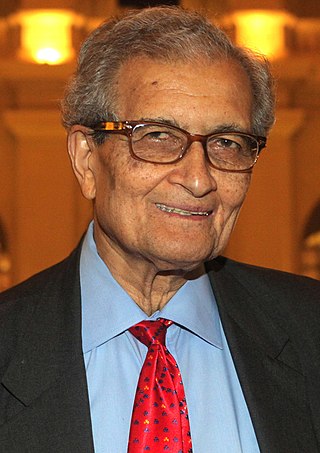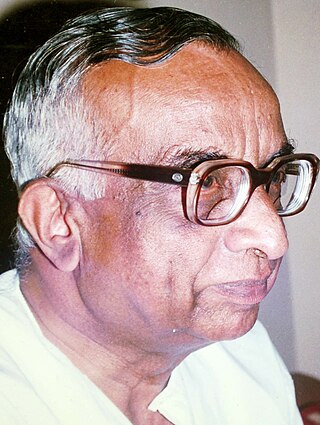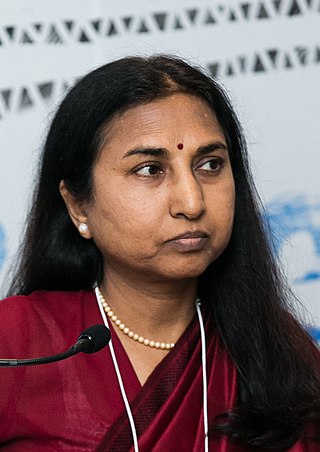
Amartya Kumar Sen is an Indian economist and philosopher. Sen has taught and worked in England and the United States since 1972. In 1998, Sen received the Nobel Memorial Prize in Economic Sciences for his contributions to welfare economics. He has also made major scholarly contributions to social choice theory, economic and social justice, economic theories of famines, decision theory, development economics, public health, and the measures of well-being of countries.

Irfan Habib is an Indian historian of ancient and medieval India, following the methodology of Marxist historiography in his contributions to economic history. He is known for his strong stance against Hindutva and Islamic fundamentalism. He has authored a number of books, notably the Agrarian System of Mughal India, 1556–1707, an Atlas of the Mughal Empire: Political and Economic Maps with Detailed Notes, and an Atlas of Ancient Indian History. As the general editor, he is also the driving force behind the A People's History of India series, volumes of which continue to be released.

Devaki Jain is an Indian economist and writer, who has worked mainly in the field of feminist economics. In 2006 she was awarded the Padma Bhushan, the third-highest civilian award from Government of India, for her contribution to social justice and the empowerment of women.

Kakkadan Nandanath Rajan was an Indian economist. He is popularly known as K. N. Raj. He played an important role in India's planned development, drafting sections of India's first Five Year Plan, specifically the introductory chapter when he was only 26 years old. He was a veteran economist in the Planning Commission. He worked out a plan to raise India's rate of savings in the post-Second World War period when the country was in need of foreign aid. He computed India's Balance of Payments for the first time for the Reserve Bank of India. Raj was an advisor to several prime ministers from Jawaharlal Nehru to P.V. Narasimha Rao. Dr. Raj was a Keynesian economist. He studied the application of Keynesian monetary theory in Indian context.
Amiya Kumar Bagchi is an Indian political economist.

Prabhat Patnaik is an Indian Marxian economist and political commentator. He taught at the Centre for Economic Studies and Planning in the School of Social Sciences at Jawaharlal Nehru University in New Delhi, from 1974 until his retirement in 2010. He was the vice-chairman of Kerala State Planning Board from June 2006 to May 2011.

Bina Agarwal is an Indian development economist and Professor of Development Economics and Environment at the Global Development Institute at The University of Manchester. She has written extensively on land, livelihoods and property rights; environment and development; the political economy of gender; poverty and inequality; legal change; and agriculture and technological transformation.

The Centre for Development Studies (CDS), Thiruvananthapuram, Kerala, India is a premier Social Science research institute. It is also a higher education institution providing M.A. course in applied economics and PhD course in economics. The institute is internationally reputed for being a centre for advanced learning in economics. Its main objective is to promote research, teaching and training in disciplines relevant to development.

Sukhadeo Thorat an Indian economist, educationist, professor and writer. He is the former chairman of the University Grants Commission. He is professor emeritus in Centre for the Study of Regional Development, Jawaharlal Nehru University. He is an expert on B. R. Ambedkar.
The Global Labour University (GLU) is an international network of universities, trade unions, NGOs and the International Labour Organisation. It was initiated in 2002 and offers master's programs, academic certificate programs and Massive Open Online Courses (MOOC) on sustainable development, social justice, international labour standards and trade/labour unions, economic policies and global institutions.

Abhijit Vinayak Banerjee is an Indian-born American economist who is currently the Ford Foundation International Professor of Economics at the Massachusetts Institute of Technology. He is co-founder and co-director of the Abdul Latif Jameel Poverty Action Lab (J-PAL), an MIT based global research center promoting the use of scientific evidence to inform poverty alleviation strategies. In 2019, Banerjee shared the Nobel Memorial Prize in Economic Sciences with Esther Duflo and Michael Kremer, "for their experimental approach to alleviating global poverty." He and Esther Duflo are married, and became the sixth married couple to jointly win a Nobel or Nobel Memorial Prize.

Deepak Nayyar is an Indian economist and academician. He is a professor of economics at Jawaharlal Nehru University, New Delhi and Chairperson of the Board of Governors of Centre for the Study of Developing Societies (CSDS) New Delhi. He has taught at the University of Oxford, the University of Sussex, the Indian Institute of Management Calcutta (IIM-C), and the New School for Social Research, New York City. He was Vice Chancellor of the University of Delhi from 2000 to 2005.

Pranab Bardhan is an Indian economist who has taught and worked in the United States since 1979. He is Professor Emeritus of Economics at the University of California, Berkeley.

Abhijit Sen was an Indian economist who focused on studying rural development. Sen was appointed to the Planning Commission of India between 2004 and 2014 and held a number of policy making positions in India. Amongst his works included recommendations toward establishment of minimum support price for farm produce and a universal public distribution system. Sen was a recipient of the Padma Bhushan, India's third highest civilian honor, in 2010.
Amiya Kumar Dasgupta was an Indian economist who has been described as "one of the founding fathers of modern economics in India" and "a true pioneer in developmental economics". He was the father of economist Sir Partha Dasgupta.
Ila Patnaik is an Indian economist. and former Principal Economic Advisor to the Government of India. During this time, she prepared the Economic Survey of India, 2013-14 and contributed to numerous Government of India committees and task forces. In 2014, she was the only female economist ranked within the top ten in India, along with the likes of Nobel Laureate Amartya Sen and former RBI governors Y V Reddy, Raghuram Rajan and Urjit Patel. She also writes regular columns for The Indian Express.
Barid Baran Bhattacharya was an Indian economist and educationist. He was vice-chancellor of Jawaharlal Nehru University. He was also Director and Professor at the Institute of Economic Growth, Delhi.

Utsa Patnaik is an Indian Marxian economist. She taught at the Centre for Economic Studies and Planning in the School of Social Sciences at Jawaharlal Nehru University (JNU) in New Delhi, from 1973 until her retirement in 2010. Her husband is the Marxian economist Prabhat Patnaik.
Tulika Books is an Indian publisher of scholarly and academic books in the humanities and social sciences, with a "broadly left perspective." The Chennai-based Tulika Publishers is a sister company of Tulika Books.
The 2019 Nobel Memorial Prize in Economic Sciences was awarded jointly to the economist couple Abhijit Banerjee, Esther Duflo-Banerjee and their colleague Michael Kremer "for their experimental approach to alleviating global poverty". Banerjee and Duflo are the sixth married couple to jointly win a Nobel Prize. The press release of the Royal Swedish Academy of Sciences noted:
"The research conducted by this year's Laureates has considerably improved our ability to fight global poverty. In just two decades, their new experiment-based approach has transformed development economics, which is now a flourishing field of research. They have laid the foundations of the best way to design measures that reduce global poverty"













